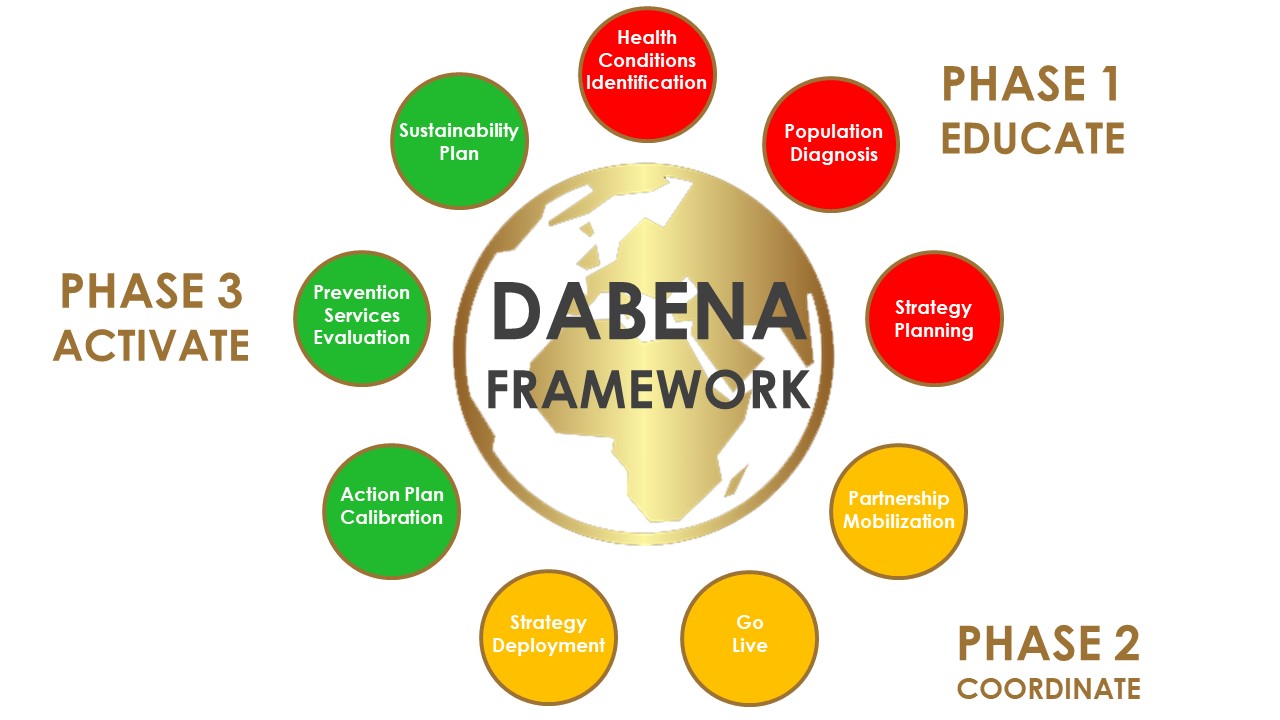The Dabena Framework Service Delivery Model includes training clients in our core competencies, a three phased approach for successful implementation and delivery of a comprehensive preventive service model to address the health challenges in the target populations. The Dabena Framework Service Delivery Model is a robust proven process that allows our clients optimal success.
“Maintaining the momentum is very important to the continuum of the preventive service program to address the health challenge.”
EDUCATE
Health Conditions Identification: Evaluate and gather data on relevant components of health determinants in the target population. Such determinants may be defined by demographics such as race, ethnicity, economic considerations, education, marital status, religion, culture, and other shared and/or unique interests within the target population at large, or a smaller rural, urban, or transient communities. Other considerations are target population infrastructures, the long-term history of the community leaders, social structures, attitudes and values, government interests and other factors such as statistical, programmatic, and scientific data (“Societal Determinants”).
Population Diagnostics: Conduct investigations and studies to identify the severity of the health challenge, the root causes and local conditions, demographic challenges, underlying risk factor, environmental scanning, challenges to adaptability, and other key factors including Societal Determinants that influence the health challenge; identify and document gaps in services and capacity and perform calibration adjustments as necessary.
Strategy Planning: Analyze the key findings and formulate an action plan tailored to address the preventive service needs unique to the target population, and formulate the objectives vis-à-vis a comprehensive vision, mission, and objectives model. The action plan includes strategies and tools for addressing and improving the health challenge, recommended policies, program and training development and systems, and creating best tips and practices in order to succeed. The action plan also outlines the budgetary and staffing expectations needed to achieve the aforementioned goals. Determine the feasibility and expected outcomes of the action plan, the policy options and articulate the implications of policy options available to the target population.
COORDINATE
ACTIVATE
Our Core Competencies
Dabena Framework Three Phased Approach
Who We Are
At Dabena Alliances, we believe strong partnerships are the building blocks of social change. The foundation of organizational effectiveness is high-performing alliances that work cross-functionally towards clearly articulated visions, missions, and goals.
Furthermore, we recognize that effective solutions derive from an organization’s greatest asset: its’ people. Our highly trained Consultants work with communities, NGOs, healthcare service organizations, law enforcement agencies, government entities (“alliances“), to name a few, to customize preventive services for the targeted populations.
Our services are customized to fit our clients’ needs, but at a minimum, include capacity-building training, leadership coaching, developing strategies in improving health services delivery systems, cross-system collaboration with other sectors, allies and stakeholders, providing technical assistance services for partnership development, advancing of health and wellness services, capacity building and providing sustainable outcomes. Our service delivery model is implemented via the Dabena Framework public health model. The core competencies our clients gain through the Dabena Framework empowers our clients to become successful and effective at delivering preventive services in the targeted populations.


